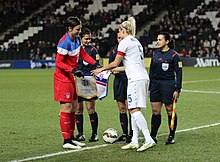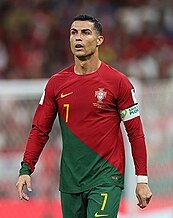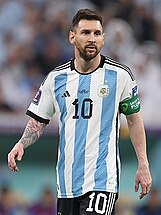
Paolo Cesare Maldini is an Italian former professional footballer who played primarily as a left-back and centre-back for AC Milan and the Italy national team. He is widely regarded as one of the greatest defenders of all time. As the Milan and Italy captain for many years he was nicknamed "Il Capitano". Maldini held the record for most appearances in Serie A, with 647 and holds the joint-record for most European Cup/UEFA Champions League final appearances (8) alongside Paco Gento. He most recently served as technical director for Milan, as well as being co-owner of USL Championship club Miami FC.

Raúl González Blanco, known as Raúl, is a Spanish football manager and former player who played as a forward. He is the current manager of Real Madrid Castilla, the reserve team of La Liga club Real Madrid. Raúl is regarded as one of the greatest players of all time.

Peter Bolesław Schmeichel is a Danish former professional footballer who played as a goalkeeper. During eight seasons at English club Manchester United, he won 15 trophies including five Premier League titles, three FA Cups and he captained the club to victory in the 1999 UEFA Champions League final to complete the Treble. Schmeichel also played for the Danish national team, with whom he won the UEFA European Championship in 1992. Regarded as one of the greatest goalkeepers of all time, he was voted the IFFHS World's Best Goalkeeper in 1992 and 1993, the International Federation of Football History & Statistics also ranked Schmeichel among the top ten goalkeepers of the 20th century.

Michael Ballack is a German former professional footballer. He was selected by Pelé as one of FIFA's 100 Greatest Living Players, and as the UEFA Club Midfielder of the Year in 2002. He won the German Footballer of the Year award three times – in 2002, 2003 and 2005. Ballack was known for his passing range, powerful shot, physical strength and commanding presence in midfield.

Frank James Lampard is an English professional football manager and former player who was most recently caretaker manager of Premier League club Chelsea. He is widely regarded as one of Chelsea's greatest players ever, and one of the greatest midfielders of his generation. He has the record of the most goals by a midfielder in the Premier League and of scoring the most goals from outside the box (41). He ranked highly on a number of statistics for Premier League players for the ten years from 1 December 2000, including most games and most wins.

Javier Alejandro Mascherano is an Argentine professional football coach and former player. As a player, he played as a centre-back or defensive midfielder, most notably for Liverpool, Barcelona and the Argentina national team. He is regarded as one of the best defenders and midfielders of his generation.

Mark Peter Gertruda Andreas van Bommel is a Dutch football coach and former player who played as a midfielder. He is currently the manager of Belgian side Royal Antwerp. His FIFA World Cup profile describes him as "a tackling machine and expert ball-winner, but he also boasts a fine array of passes and a powerful shot, having been a free-kick specialist during his PSV days".

Xavier Hernández Creus, also known as Xavi Hernández or simply Xavi, is a Spanish professional football manager and former player who manages La Liga club Barcelona. Widely considered one of the greatest midfielders of all time, Xavi was renowned for his passing, vision, ball retention, and positioning. He won 32 trophies in his career, making him the second-most decorated Spanish player in history, behind former teammate Andrés Iniesta.
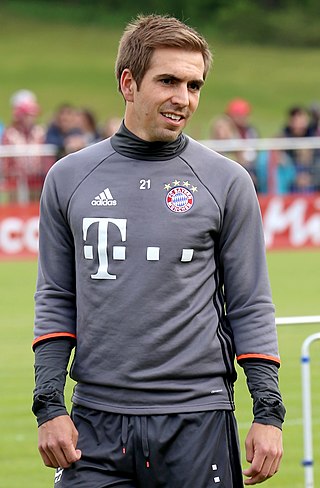
Philipp Lahm is a German former professional footballer who played as a full-back. Considered by many to be one of the greatest full-backs of all time, Lahm was the longtime captain of Bayern Munich, having led them to numerous honours including the 2013 UEFA Champions League as part of the Treble. He is also a former captain of his national team, which he led to win the 2014 FIFA World Cup, before retiring from international football.

Kasper Peter Schmeichel is a Danish professional footballer who plays as a goalkeeper for Belgian Pro League club Anderlecht and the Denmark national team.
The history of the European Cup and UEFA Champions League spans over sixty years of competition, finding winners and runners-up from all over the continent.

The 1999 UEFA Champions League final was an association football match between Manchester United of England and Bayern Munich of Germany, played at Camp Nou in Barcelona, Spain, on 26 May 1999, to determine the winner of the 1998–99 UEFA Champions League. Injury time goals from Manchester United's Ole Gunnar Solskjær cancelled out Mario Basler's early goal for Bayern to give Manchester United a 2–1 win and their first European Cup title since 1968, their second overall. Referee Pierluigi Collina has cited this match as one of the most memorable of his career, and described the noise from the crowd at the end of the game as being like a "lion's roar".
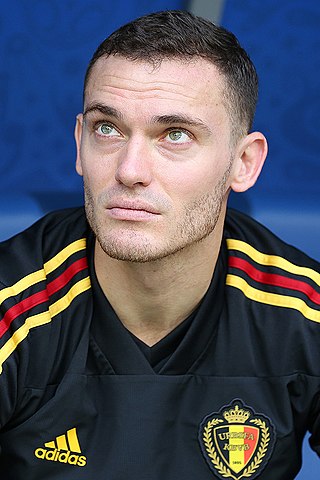
Thomas Vermaelen is a Belgian former professional footballer. Being left-footed, he usually played as a left-sided centre-back and could play at left-back as well. His key attributes included aerial ability, leadership skills, and his quickness with the ball at his feet. He was also known for his goalscoring ability as a defender.

Kevin-Prince Boateng is a former professional footballer who played as a midfielder or forward. Born in Germany, he played for the Ghana national team.

The 2008 UEFA Champions League final was a football match that took place on 21 May 2008 at the Luzhniki Stadium in Moscow, Russia, to determine the winner of the 2007–08 UEFA Champions League. It was contested by Manchester United and Chelsea, making it an all-English final for the first time in the history of the competition; it was only the third time that two clubs from the same country had contested the final, after 2000 and 2003. It was the first European Cup final played in Russia, and hence the easternmost final in the tournament's history. It also marked the 100th anniversary of Manchester United's first league triumph, the 50th anniversary of the Munich air disaster, and the 40th anniversary of United's first European Cup triumph in 1968. It was Manchester United's third European Cup final after 1968 and 1999, while it was Chelsea's first.

The 2011 UEFA Champions League final was an association football match played on 28 May 2011 at Wembley Stadium in London that decided the winner of the 2010–11 season of the UEFA Champions League. The winners received the European Champion Clubs' Cup. The 2011 final was the culmination of the 56th season of the tournament, and the 19th in the Champions League era.
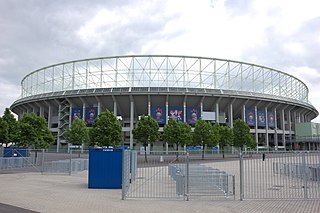
The UEFA Euro 2008 Final was the final match of Euro 2008, the thirteenth edition of the European Football Championship, UEFA's competition for national football teams. The match was played at Ernst-Happel-Stadion, Vienna, Austria, on 29 June 2008, and was contested by Germany and Spain. The sixteen-team tournament consisted of a group stage, from which eight teams qualified for the knockout phase. En route to the final, Germany finished second in Group B, with a defeat to Croatia and wins over Poland and Austria, after which they defeated Portugal and Turkey in the knockouts. Spain finished top of Group D with three wins, against Russia, Sweden and Greece, before defeating Italy on penalties in the quarter-final and a second victory over Russia in the semi-final.

The 2012 UEFA Champions League final was an association football match which took place on Saturday, 19 May 2012 between Bayern Munich of Germany and Chelsea of England at the Allianz Arena in Munich, Germany. The match was to decide the winner of the 2011–12 season of the UEFA Champions League, Europe's premier club football tournament. Bayern were making their ninth appearance in the competition's final, having won four and lost four, most recently losing in 2010. Chelsea were appearing in their second final, having lost their first in 2008.

The 2013 UEFA Champions League final was the final match of the 2012–13 UEFA Champions League, the 58th season of Europe's premier club football tournament organised by UEFA, and the 21st season since it was renamed from the European Champion Clubs' Cup to the UEFA Champions League.
This article documents the history of Chelsea Football Club, an English association football team based in Fulham, West London. For a general overview of the club, see Chelsea F.C.

